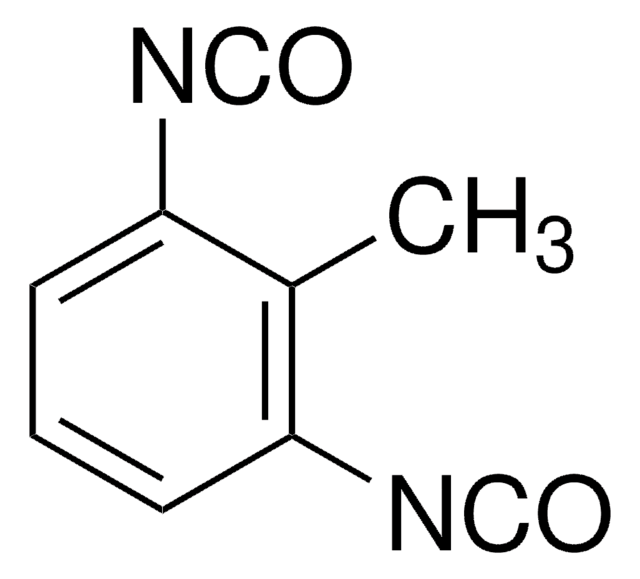216836
Tolylene-2,4-diisocyanate
technical grade, 80%
Synonym(s):
2,4-Diisocyanatotoluene, 4-Methyl-1,3-phenylene diisocyanate, 4-Methyl-m-phenylene diisocyanate, BASF LUPRANATE T80, TDI
About This Item
Recommended Products
grade
technical grade
vapor density
6 (vs air)
vapor pressure
0.03 mmHg ( 25 °C)
Assay
80%
autoignition temp.
>1148 °F
expl. lim.
9.5 %
refractive index
n20/D 1.568 (lit.)
bp
115-120 °C/10 mmHg (lit.)
mp
20-22 °C (lit.)
solubility
acetone and ethanol: soluble(lit.)
alcohol: miscible(lit.)
benzene: soluble(lit.)
carbon tetrachloride: miscible(lit.)
chlorobenzene: miscible(lit.)
diethyl ether: miscible(lit.)
kerosene: miscible(lit.)
olive oil: miscible(lit.)
density
1.225 g/mL at 25 °C
storage temp.
2-8°C
SMILES string
Cc1ccc(cc1N=C=O)N=C=O
InChI
1S/C9H6N2O2/c1-7-2-3-8(10-5-12)4-9(7)11-6-13/h2-4H,1H3
InChI key
DVKJHBMWWAPEIU-UHFFFAOYSA-N
Looking for similar products? Visit Product Comparison Guide
Other Notes
Legal Information
Signal Word
Danger
Hazard Statements
Precautionary Statements
Hazard Classifications
Acute Tox. 1 Inhalation - Aquatic Chronic 3 - Carc. 2 - Eye Irrit. 2 - Resp. Sens. 1 - Skin Irrit. 2 - Skin Sens. 1 - STOT SE 3
Target Organs
Respiratory system
Storage Class Code
6.1A - Combustible acute toxic Cat. 1 and 2 / very toxic hazardous materials
WGK
WGK 2
Flash Point(F)
269.6 °F - closed cup
Flash Point(C)
132 °C - closed cup
Personal Protective Equipment
Certificates of Analysis (COA)
Search for Certificates of Analysis (COA) by entering the products Lot/Batch Number. Lot and Batch Numbers can be found on a product’s label following the words ‘Lot’ or ‘Batch’.
Already Own This Product?
Find documentation for the products that you have recently purchased in the Document Library.
Customers Also Viewed
Our team of scientists has experience in all areas of research including Life Science, Material Science, Chemical Synthesis, Chromatography, Analytical and many others.
Contact Technical Service









